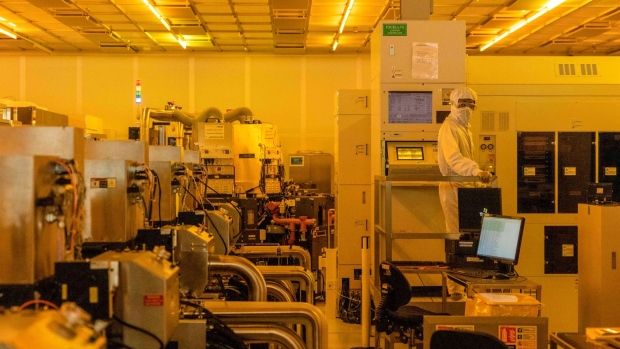Aug 27, 2022
A Chinese Microchip Deal Shows the UK’s Muddled Industrial Plan
, Bloomberg News

(Bloomberg) -- The Newport Wafer Fab near Cardiff in Wales has long churned out wafers for microchips used in cars or kettles. Now the UK government is deliberating whether to block a Chinese company from remaining the new owner, exposing the political dilemma between supporting a key industry and keeping Beijing’s influence in check.
UK Business Secretary Kwasi Kwarteng has spent months weighing his response to Wingtech Technology Co. buying the country’s biggest semiconductor facility, a deal originally backed when the Chinese company announced it last year. A final ruling might arrive in the coming days, after Kwarteng extended his review in early July.
Ripping up the accord could put Newport’s future at risk, dealing a blow to a site that once held a technological promise in so-called compound microchips but lacked the financial or political muscle to push its advantage.
That’s where Wingtech saw an opening and swooped in. However, the new owner has raised not just political concerns, but also fears that Newport will become a walled-off site serving just one master rather than the center of a technology cluster able attract a wider range of entrepreneurs and academics.
The site is composed of two main facilities, one for wafers used in silicon microchips, while the other has sat mostly unused for at least the past eight years. But it’s at this unused facility, called Fab 10, where British chip experts had hoped to create the nucleus for compound chips that are used increasingly in areas like electric vehicles, facial recognition and 5G wireless technology.
Proponents of turning Fab 10 into a compound-chip hub say the UK has a better chance of betting on that technology rather than entertaining an expensive and unlikely prospect of catching up with silicon giants like Taiwan Semiconductor Manufacturing Co. The government-backed Compound Semiconductor Applications Catapult estimates Britain has about 9% market share in compounds already today.
Wingtech’s arrival in Newport, via its Dutch Nexperia subsidiary, has laid bare the government’s lack of strategy a key industry. That’s now forced ministers to make uncomfortable choices between granting control of the facility to a foreign entity or making a bet on emerging technologies.
“It is a blow to the cluster — it’s set them back,” said Malcolm Penn, an industry analyst and former director at the Newport site, said of Nexperia’s arrival. “There was absolutely no reason why the UK could not have set itself a strategy at the industrial level to say the UK will have a compound semiconductor leadership position in ten years’ time.”
For now, startups hoping to work on compound chips will need to look elsewhere because Newport only makes chips for its Chinese owner’s specific needs. Nexperia says there was never an open-access compound semiconductor foundry, and that its own business model is best to secure the site’s future.
Undoing a year of integration by blocking the deal would not help the UK's semiconductor industry grow, a Nexperia spokesperson said
While there’s still an option to use the Fab 10 site for compound chips, it looks difficult to exercise: Nexperia said it needs a viable business plan with confirmed financing, and that establishing a compound foundry would likely cost more than £120 million. A report by the Policy Exchange think tank said Nexperia could shut down Newport once a much larger fab it’s building in Shanghai is ready, citing opponents of the deal. Nexperia has denied such plans.
Whatever the future of the site, the UK’s muddled response to Newport’s ownership hasn’t helped secure the future of a domestic semiconductor industry, particularly at a time when chips are in high demand and governments are eager to bring more production back home from Asia.
“The government has failed to recognise the strategic importance of the semiconductor industry for years and is now falling behind the EU and the US,” said Darren Jones from the opposition Labour party, who chairs the influential business select committee. “If we’re going to keep the businesses we have, in the areas where we excel, we’re going to need ministers to get much more involved in this vital sector.”
The Newport deal was initially waved through after it was announced last year. Prime Minister Boris Johnson then said his national security adviser would initiate a review, with a public outcome still pending. Some 10 months later, Kwarteng launched a separate probe under the new National Security and Investment Act, which gives Britain the power to impose conditions or unpick transactions in sensitive sectors including semiconductors.
Ripping up the deal would be a radical, unprecedented step that could spook international investors. But some US and UK lawmakers have urged Britain to veto the deal on security grounds, and other buyers are potentially waiting in the wings, like a consortium led by Ron Black, the former CEO of British chip design firm Imagination Technologies Group Ltd.
The UK boasts global chip champions like Cambridge-based Arm Ltd., but the company specialize in chip design rather than production. Governments have sought to attract hardware producers with subsidies and a promise of political support, like Magdeburg in Germany, the site of a new massive Intel Corp. facility.
In the US, the Chips Act is offering $52 billion to attract businesses, while the European Union’s own initiative could mean investments worth 45 billion euros ($45.4 billion).
But the UK hasn’t yet followed suit, and Brexit certainly hasn’t helped: Intel cited the divorce as a reason Britain wouldn’t see its future factory investments, worth as much as $95 billion.
©2022 Bloomberg L.P.





